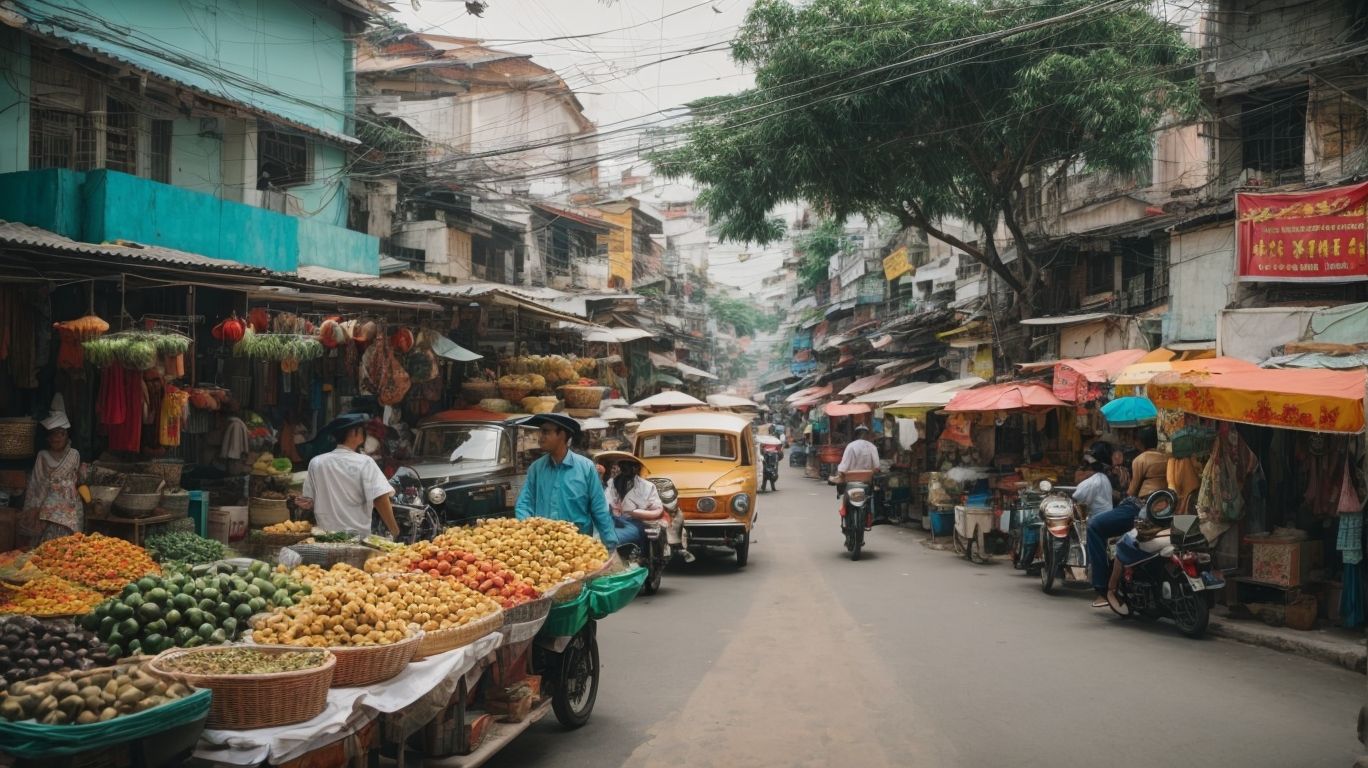
Are you curious about the life of an expat in Saigon, Vietnam? Look no further. In this article, we will delve into the unique experiences and challenges faced by those who have left their home country to start a new life in this bustling city. Get ready to be intrigued and enlightened.
What Is An Expatriate?
An expatriate is someone who lives in a country other than their own. They may choose to move abroad for various reasons, such as work, retirement, or a desire for adventure. Expatriates often fully immerse themselves in the local culture, learning the language and adapting to the customs of their new home. While they may face challenges such as language barriers and cultural differences, they also have the opportunity to explore new places, meet diverse people, and expand their perspectives. To fully embrace the expatriate lifestyle, it is important to maintain an open mind, be proactive, and show respect for the local community.
Why Do People Choose to Live as an Expatriate in Saigon Vietnam?
Have you ever wondered what it would be like to live as an expatriate in Saigon, Vietnam? More and more people are choosing to call this vibrant city their home, and for good reason. In this section, we will delve into the factors that attract expats to this bustling metropolis. From job opportunities to the lower cost of living, cultural experiences to adventure and travel opportunities, there are many reasons why people choose to live as an expatriate in Saigon. Let’s take a closer look at each one.
1. Job Opportunities
Living as an expatriate in Saigon, Vietnam offers a plethora of job opportunities for individuals seeking professional growth and new experiences.
- Research the job market and industries that are thriving in Saigon to discover potential opportunities.
- Network with local professionals and attend job fairs to explore the available positions.
- Consider teaching English as a foreign language, as it is a popular choice for expatriates in Saigon.
- Utilize online job platforms and recruitment agencies to search for job openings.
- Be prepared to adapt to the local work culture and practices in order to succeed in your new job.
2. Lower Cost of Living
Living as an expatriate in Saigon Vietnam offers the advantage of a lower cost of living compared to many other major cities around the world. Here are some steps to consider when it comes to reducing expenses:
- Accommodation: Look for affordable housing options in local neighborhoods or consider sharing an apartment with other expats.
- Food and Dining: Explore local markets and street food stalls for inexpensive and delicious meals. Cook at home more often to save money.
- Transportation: Utilize public transportation like buses or motorbike taxis, which are more budget-friendly than owning a car.
- Entertainment and Leisure: Seek out free or low-cost activities such as visiting public parks, joining local clubs, or attending cultural events.
Pro-tip: Embrace the local lifestyle and immerse yourself in the vibrant street food culture to save money and experience the true essence of Saigon Vietnam.
3. Cultural Experience
Experiencing the culture as an expatriate in Saigon, Vietnam involves immersing yourself in the local customs and traditions. Here are some steps to enhance your cultural experience:
- Explore local cuisine by trying popular dishes like pho, banh mi, and fresh spring rolls.
- Participate in traditional festivals and events, such as Tet (Lunar New Year) or the Mid-Autumn Festival.
- Visit historical landmarks and museums to fully immerse yourself in Vietnam’s rich history and diverse heritage.
- Engage with the local community through language exchange programs or volunteering opportunities to gain a deeper understanding of the culture.
By embracing the cultural diversity and actively seeking out authentic experiences, you can make the most of your time as an expatriate in Saigon, Vietnam.
4. Adventure and Travel Opportunities
Living as an expatriate in Saigon, Vietnam offers a multitude of opportunities for adventure and travel, perfect for individuals seeking new and exciting experiences. Here are some steps to take in order to explore these opportunities:
- Research: Gain knowledge about popular destinations and activities in Vietnam, such as trekking in Sapa or exploring the Mekong Delta.
- Plan: Create an itinerary and budget for your adventures, considering factors like transportation, accommodation, and tour costs.
- Connect: Join expat groups or online communities to connect with fellow adventurers, share experiences, and get recommendations.
- Explore local culture: Immerse yourself in the vibrant Vietnamese culture by trying local cuisine, visiting historical sites, or attending traditional festivals.
- Take advantage of proximity: Utilize Saigon’s central location to embark on trips to nearby countries like Cambodia, Laos, or Thailand.
What Is the Cost of Living in Saigon Vietnam for Expatriates?
As more and more people are choosing to live and work abroad, the expatriate lifestyle in Saigon, Vietnam has become increasingly popular. One of the key considerations for expats is the cost of living in this bustling city. In this section, we will delve into the different aspects of expenses that expatriates may encounter while living in Saigon. From accommodation and food to transportation and entertainment, we will provide a comprehensive overview of the cost of living in this vibrant city.
1. Accommodation
When searching for a place to live as an expatriate in Saigon, Vietnam, consider the following steps:
- Research: Look for online resources and real estate agents that specialize in expat housing.
- Budget: Determine your budget and decide whether you want to rent or buy.
- Location: Choose a neighborhood that meets your needs and preferences.
- Type of accommodation: Decide between apartments, serviced apartments, or houses.
- Amenities: Take into account the facilities and amenities offered, such as parking, security, and access to public transportation.
- Visit and inspect: Schedule visits to potential properties to assess their condition and suitability.
- Negotiate: Bargain for a fair price and favorable terms with the landlord or agent.
- Contract: Carefully review the rental agreement before signing and ensure that it includes all necessary details and provisions.
- Utilities and services: Understand the costs and responsibilities for utilities and maintenance.
- Move-in: Coordinate with the landlord or agent for a smooth transition into your new living space.
2. Food and Dining
Food and dining in Saigon, Vietnam offer a rich culinary experience for expatriates. Here are some steps to explore the vibrant food scene:
- Try the local street food, such as phở (noodle soup) and bánh mì (baguette sandwiches), for an authentic taste of Vietnamese cuisine.
- Visit popular food markets like Ben Thanh Market or Binh Tay Market to discover a wide variety of fresh produce, spices, and local delicacies.
- Explore the diverse range of international cuisine available in Saigon, including Japanese, Korean, Italian, and more.
- Experience traditional Vietnamese dining customs, such as sharing dishes with friends and family and using chopsticks.
Pro-tip: Don’t be afraid to try new dishes and flavors, and be adventurous with street food – it’s often where you’ll find the most delicious and authentic Vietnamese dishes.
3. Transportation
- Public transportation: Saigon has an extensive public transportation system, including buses, taxis, and motorbike taxis, making it easy to get around the city.
- Motorbikes: Motorbikes are a popular mode of transportation in Saigon, offering flexibility and convenience. However, be cautious as traffic can be chaotic.
- Private vehicles: Owning or renting a car is an option for expatriates in Saigon, providing more comfort and convenience for travel.
- Ride-sharing services: Services like Grab and GoViet are widely available in Saigon, offering a convenient and affordable way to get around the city.
- Transportation apps: Utilize transportation apps to navigate the city, plan routes, and check for real-time traffic updates.
4. Entertainment and Leisure
Living as an expatriate in Saigon, Vietnam offers a wide range of entertainment and leisure activities. Expats can immerse themselves in the vibrant nightlife scene, with a plethora of bars, clubs, and live music venues to choose from. They can also savor the delicious Vietnamese cuisine at street food stalls or upscale restaurants. Saigon is also host to various cultural festivals, art exhibitions, and theater performances, providing expats with enriching experiences. For those who enjoy the great outdoors, there are opportunities for hiking, biking, and exploring nearby beaches. Additionally, there are shopping centers, spas, and wellness centers where expats can unwind and rejuvenate. Overall, Saigon offers a diverse range of entertainment options for expatriates to enjoy.
What Is the Expat Community Like in Saigon Vietnam?
As the expat community in Saigon Vietnam continues to grow, more and more people are curious about what life is like for foreigners living in this bustling city. In this section, we will take a closer look into the expat community in Saigon and explore the various aspects that make up this unique lifestyle. From networking and social events to support and resources, as well as the challenges of language and cultural barriers, we will provide a glimpse into the diverse and vibrant expat community in Saigon.
1. Networking and Social Events
Networking and social events are crucial for expatriates living in Saigon, Vietnam to establish connections and foster a sense of community. To effectively engage in these events, here are some steps expatriates can take:
- Join expat groups and organizations in Saigon, such as professional associations or social clubs.
- Attend networking events and meetups specifically designed for expatriates, where you can connect with like-minded individuals.
- Participate in cultural and community events, such as festivals or charity initiatives, to meet locals and other expatriates.
- Utilize online platforms and social media groups to discover networking opportunities and events in Saigon.
Fact: Saigon has a thriving expat community, with a plethora of networking and social events happening regularly, providing ample opportunities for expatriates to meet new people and expand their social and professional circles.
2. Support and Resources
Living as an expatriate in Saigon, Vietnam offers access to a variety of support and resources to help individuals navigate their new environment. Here are some steps to take advantage of these support and resources:
- Research online expat communities and forums for valuable advice and information.
- Join expat organizations and clubs to connect with fellow expats and gain support.
- Attend networking events and social gatherings to build connections and expand your support network.
- Seek out local support groups for expats who share similar experiences and challenges.
- Utilize the resources provided by your employer or relocation agency to make the transition smoother.
- Take advantage of language classes and cultural programs to help ease the transition into your new environment.
3. Language and Cultural Barriers
Living as an expatriate in Saigon, Vietnam can present challenges with language and cultural barriers that may require some adjustment. Here are some steps to navigate these challenges:
- Learn the local language: Taking language classes or using language learning apps can help overcome language barriers.
- Embrace cultural differences: Learn about Vietnamese customs and traditions to show respect and avoid unintentional cultural misunderstandings.
- Seek out language exchange programs: Participating in language exchange programs can help improve language skills and foster cultural understanding.
- Engage with the local community: Joining local social groups or organizations can provide opportunities to connect with locals and learn more about the culture.
Fact: Saigon, now known as Ho Chi Minh City, is the largest city in Vietnam and offers a vibrant mix of traditional and modern Vietnamese culture.
What Are the Challenges of Living as an Expatriate in Saigon Vietnam?
Living as an expatriate in Saigon, Vietnam is an exciting and rewarding experience, but it also comes with its own set of challenges. In this section, we will delve into the various obstacles that expats may face while living in this bustling city. From navigating the visa and work permit process to dealing with culture shock and homesickness, we will discuss the many challenges that come with being an expat in Saigon. Additionally, we will explore the language barrier and adjusting to different standards of living, providing insight into the unique experiences of expatriates in Vietnam.
1. Visa and Work Permits
To obtain a visa and work permit in Saigon, Vietnam, expatriates must follow a specific process. Here are the steps to acquiring a visa and work permit:
- Research visa requirements, such as the type of visa needed and the necessary documents.
- Submit a visa application to the Vietnamese embassy or consulate in your home country.
- Once in Saigon, apply for a work permit at the Department of Labor, Invalids, and Social Affairs.
- Prepare documents for the visa and work permit application, including a valid passport, health check, and employment contract.
- Obtain a temporary residence card from the immigration office to legally reside in Vietnam.
By following these steps, expatriates can ensure they have the necessary visa and work permit to live and work in Saigon, Vietnam.
2. Culture Shock and Homesickness
Expat life in Saigon, Vietnam can be both exhilarating and challenging, especially when it comes to dealing with culture shock and homesickness. Adapting to a new culture, language, and way of life can be overwhelming and may lead to feelings of disorientation and longing for home. Expatriates may struggle with understanding local customs, social norms, and communication styles. However, there are ways to cope with culture shock and homesickness. Engaging in local activities, making friends within the expat community, and seeking support from resources such as expat groups can help alleviate these challenges and make the transition smoother.
3. Language Barrier
As an expatriate in Saigon, Vietnam, overcoming the language barrier can be a challenge. However, with the right approach, it is possible to navigate daily life effectively.
- Learn basic phrases: Start by familiarizing yourself with common greetings, expressions, and simple phrases to communicate in daily interactions.
- Take language classes: Enroll in language classes or hire a tutor to improve your language skills and enhance your ability to communicate.
- Immerse yourself in the culture: Engage with the local community, participate in cultural activities, and make friends with native speakers to practice the language.
- Utilize language apps: Supplement your language learning journey by using language learning apps like Duolingo or Rosetta Stone.
Remember, practice makes perfect. Don’t be afraid to make mistakes and continue practicing to improve your language skills over time. Good luck!
4. Adjusting to Different Standards of Living
Adjusting to different standards of living as an expatriate in Saigon, Vietnam can be made easier by following these steps:
- Research: Take the time to familiarize yourself with the local culture, customs, and lifestyle to gain a better understanding of what to expect.
- Flexibility: Be open-minded and adaptable to new ways of doing things, including food, transportation, and daily routines.
- Budgeting: Adjust your financial expectations and prioritize your spending based on the cost of living in Saigon.
- Communication: Learn basic phrases in the local language and make an effort to connect with locals to bridge cultural gaps.
Remember, embracing the differences and seeking support from the expat community can also help make the adjustment process smoother.






